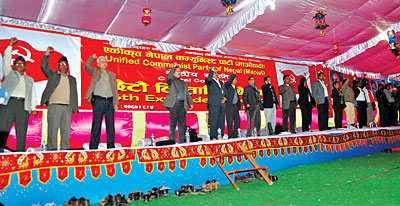 RSS |
Maoist Chairman Pushpa Kamal Dahal, after labouring for weeks to put together a document for the party's extended plenum at Palungtar in Gorkha District, has come up with a great discovery: identifying our national enemy.
Congratulations. Now we know what has held back our progress, our march to peace and prosperity. And who else but the favourite punching bag of communists and royalists alike: India. Identifying India as Nepal's enemy means protecting nationalism, safeguarding sovereignty, and ending our southern neighbour's interference in internal matters. Did someone say patriotism is the last refuge of scoundrels?
Dahal is known for his capacity to surprise people, be it in striking deals and in breathtakingly breaching them, shedding timely tears, resorting to uncontrolled outbursts (usually at the sight of thousands of his cadre), or simply in his interactions with national and international actors. He is a charmer, no doubt.
However, this time he has failed to surprise. Unable to secure a meeting with top Indian officials despite a series of efforts, he is frustrated. India's sustained snub is having an effect on Comrade Chairman. So he is back to India-bashing.
Faced with an open challenge to his leadership by two vice chairmen � Mohan Baidya and Baburam Bhattarai � and confronted by disappointed and angry cadres in Palungtar who feel betrayed, something drastic had to be done. Hence the methodical madness in parliament, in the full glare of live TV coverage.
Dahal may have felt a bit easier in the aftermath of this ugly incident, but it will be a challenge for him to escape unscathed this time. The chairman can hope to contain the damage done so far to the lustre surrounding his leadership. Like in the past, the leaders are likely to patch it up and show a public face of unity with raised fists.
But the Maoists' internal feud is reality. What is equally true, and perhaps of more significance to non-Maoist parties, is the absolute inability and unwillingness on the part of the Maoist leadership to wean their cadre off revolutionary misadventure.
The leaders have been unable to drill home the point that the kind of revolution they are espousing is simply not possible. They are too cowardly to tell their cadre that their 'jana yuddha' (people's war) failed to achieve the goal of state capture, which was why they had to enter into a peace agreement with the very political parties they had vilified throughout their decade-long insurgency.
This is the crux of the problem. The Maoists see doublespeak as an effective tool to clear hurdles in the way of their march to power. After all, it has paid them rich dividends so far.
However, there is a growing realisation among other political parties that they have been unable to transform the Maoists. The leaked documents of Dahal, Baidya and Bhattarai have a common goal: absolute control by the Maoists of the state apparatus. The peace process and drafting of the constitution are a means to that end and the Maoists have said so a number of times. What can and will the non-Maoists parties do about it?
The fate of the 12-point agreement of November 2005 that brought the Maoists and non-Maoists together against the absolute monarchy and the subsequent Comprehensive Peace Accord (CPA) of 2006 hangs in the balance. The Maoists have violated these pacts at will and the latest example is the participation of Maoist ex-combatants, who draw government salaries and are supposedly not under the Maoist Party's leadership, at the Palungtar plenum.
Are these two landmark agreements still relevant? These are the questions that non-Maoist parties need to reflect on before they hastily enter into another non-implementable agreement with the Maoists.
[email protected]
READ ALSO:
Two-faced, yes. Two-souled?, EDITORIAL
Widening gulf, PRASHANT JHA



